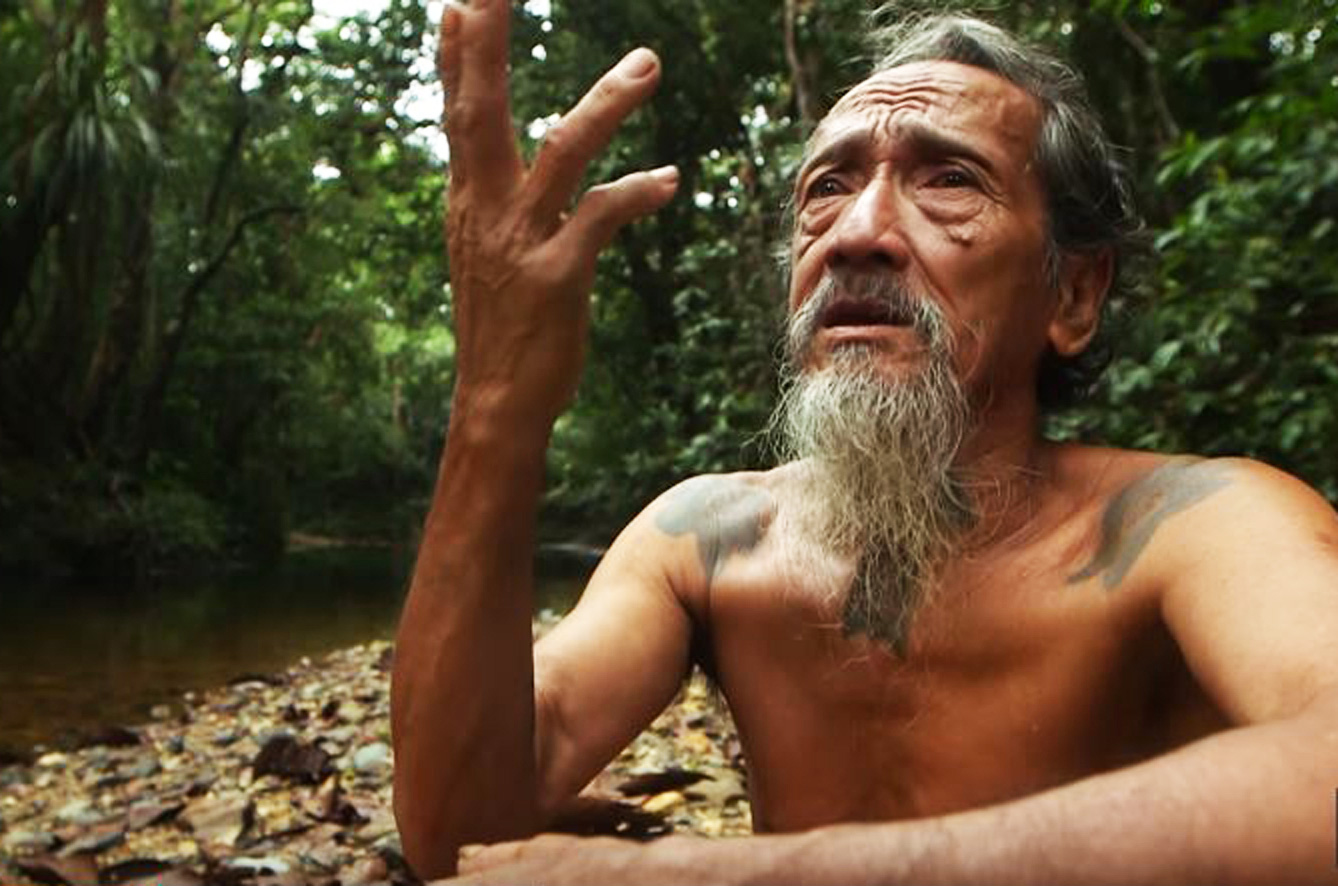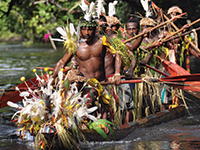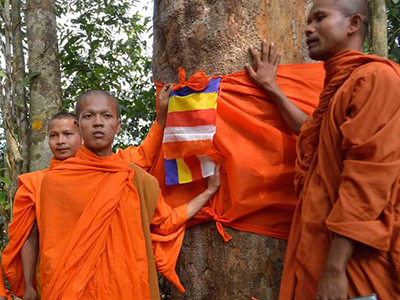From Papua New Guinea to the tar sands of Alberta, Canada, native people…
5x5: Voices of Change from the Forests of Indonesia + Hope: Indigenous Climate Change Solutions

- Description
- Reviews
- Citation
- Cataloging
- Transcript
View on The Global Environmental Justice site
These six short films can be accessed individually by their time codes below, or via the 'Clips' tab above.
Curator
This film was selected by Jason A. Carbine, C. Milo Connick Chair of Religious Studies, Associate Professor Department of Religious Studies, Whittier College
Teacher's guide
Please see the teacher's guide for maps, background information, suggested subjects, questions and activities.
A note from the Curator
The guide was written with the collaboration of students in my fall semester 2019 first-year writing seminar, “Asia and the Environment,” a course built around films in the GEJ collection. In this course, we sought to understand the relationships between natural resources culture, power, environmental degradation, and ethnic identities, among other topics, as evident in Asia generally but specifically in Southeast Asia and China. We drew from various documentaries and used several analytical disciplines—including history, religious studies, political science, and anthropology—to help think through the impact of human activity on people, animals, and the environment as a whole. This guide emerged from our discussions, and the students in the course are acknowledged at the end of the guide.
Why we selected these films
Given the hundreds of millions of people around the world who depend on forests for their livelihoods and the number of people, organizations, institutions, and nation-states that are involved in resource extraction from them, the problems resulting from illegal and destructive logging are relevant to all. With the participation of students in my class at Whittier College, we chose these films for their intimate, accessible portrayal of efforts to address the issue of illegal logging in Indonesia. These six films explore the struggles indigenous and other people face, the hardships they endure, and the need for collective action and coalition building to bring about positive change and the sustainable use of forests. While specific to Indonesia, these films can be screened alongside others that address these issues in other countries in Southeast Asia and around the world.
Synopses
1. 00:00 - 05:10
Knasaimos People, Serimuk, West Papua, Indonesia
The Knasaimos, deeply affected by illegal logging, gain greater control of their land. The illegal logging trade destroyed their livelihoods and disrupted the social structure of their villages, but a recent government enforcement action has since clamped down on the trade. The film highlights the success of the enforcement and examines how the local communities will benefit from an increased share and control of their ancestral forestland.
Since 2002, the Environmental Investigation Agency (EIA) and Telapak have worked with the Knasaimos people as affiliated NGOs. Together, the two NGOs exposed the rampant illegal logging in the area, which led to the government enforcement action in 2005. This work is part of their global campaign to promote ideas and distribute information to improve forest policy in Indonesia and throughout the world. They have since been initiated into the Knasaimos tribe and continue to help them decide their future.
2. 05:10- 11:15
Dayak Meratus Meratus Mountain Area, Kalimantan, Indonesia
The Daka Meratus, threatened by logging, mining and oil palm plantations organize cooperatives and seek legal recognition of their rights to the forest. Dayak Meratus communities have created cooperatives that protect local resources and develop business institutions. The communities use non-timber forest products such as rubber to generate sustainable livelihoods. However, the encroachment of private businesses on the local forestland for large scale plantations, mining and forest concessions threaten their way of life and have forced them to respond. Affiliated NGO: Since 1998 Lembaga Pemberdayaan Masyarakat Adat (LPMA) have helped strengthen the Meratus Dayak by maintaining their indigenous forests. This work assists the Dayak in managing their natural resources, restructuring indigenous institutions and community law. The Dayak have become financially self-sufficient and with LPMA they are now seeking legal recognition of their traditional land rights.
3. 11:15-17:15
The Forests of South East Sulawesi Konawe Selatan, Sulawesi, Indonesia
Forest communities in Sulawesi have created Indonesia’s first sustainable logging cooperative, but endemic corruption could undermine their success. Local people have developed a sustainable, community-based logging cooperative, with land purchased by the community and farmed for teak. The cooperative is the first in Indonesia to achieve Forest Stewardship Council (FSC) certification for sustainability, helping to regulate timber production and secure fair prices. However, this logging program is under continued threat by Indonesia’s endemic corruption.
The South Sulawesi Forest Network Institution (Jaringan Untuk Hutan, or JAUH), a local NGO, formed a partnership with another community logging cooperative, Koperasi Hutan Jaya Lestari (KHJL). Together, they have improved forest management in the region and achieved FSC certification for the timber KHJL produces. JAUH continues to work defending the cooperative in the face of renewed pressure from the illegal-timber industry.
4. 17:15-23:25
Indonesian Civil Society
Members of Indonesian civil society travel to Brussels to urge European countries to create better laws for combating illegal timber entering the European Union.
A West Papuan tribal leader accompanies the delegation and presents a speech on behalf of his community, who have suffered directly from the impact of illegal logging. These meetings and the continued work of Indonesian civil society has meant that they have now been officially recognised as an integral part of the negotiations between the EU and the Indonesia government on illegal logging.
Since 1999, the Environmental Investigation Agency (EIA) and Telapak, an NGO, have been providing training to a network of grassroots NGOs in Indonesia. By using video, photography, and evidence-gathering techniques, this project has significantly enhanced the ability of local organizations and communities to ensure their voices are heard globally. Their work has also included lobbying consumer countries that import illegally harvested Indonesian timber.
5. 23:25-29:30
Bukit Lawang North Sumatra, Indonesia Illegal logging in a national park in North Sumatra triggers devastating floods. Could voluntary controls and increased tourism help to preserve the forests that the community relies on?
The film is based in Bukit Lawang, where severe flooding caused more than 239 deaths in 2003. The flooding was attributed to illegal logging in the surrounding Gunung Leuser National Park. Since then, the local communities have been involved in voluntary forest governance and enforcement schemes to help curb the ongoing problem of illegal logging in the national park. And through the assistance of Yayasan Leuser Lestari (YLL), a local NGO, the people have started to recognize the importance of ecotourism in the preservation of their surrounding forests.
Medan-based YLL has worked to raise the profile of ecotourism in Bukit Lawang. Their efforts have also involved tracking court cases to determine the cause of the flooding. They regularly conduct investigations into illegal logging in order to campaign against forest destruction and land conversion.
6. 29:30-36:55
Hope: Indigenous Climate Change Solutions
The filmmakers visit the Sungai Utik people, a Dayak Iban community living deep in the rainforest of West Kalimantan, Indonesia. The community represent a simple solution to the global climate crisis. These people have maintained a strong traditional connection to their forests despite continued pressure from companies intent on taking their land. Their forests remain intact, and their traditional values keep their community together. If we want to protect and maintain the forests, the filmmakers suggest, we need to trust and support communities like these. Now, as they tackle the impacts of climate change, the creative response of the Dayak Iban offers us hope.
The environmental justice focus of the films
This collection of films inspires deep reflection on several interconnected human and environmental issues. It examines the impact of land grabs, logging, oil palm plantations, mining, and the disregard for ecosystems that has been compromising the forests of Indonesia, threatening the survival of endangered species, and fueling climate change. In the words of local indigenous leaders, who are often opposed by governments and corrupt local officials, the destruction of the forests directly threatens their land, homes, livelihoods, and cultures as well as the region’s biodiversity. Together with local and international non-governmental organizations (NGOs), they are documenting the impact of environmental degradation and are actively seeking ways to mitigate climate change, protect the forests, defend their cultures, and bring about a just economy. These films invite viewers to imagine what an environmentally just Indonesia—or any other country where illegal logging threatens local and indigenous peoples and cultures—can or would be like as the result of listening to the many “voices of change,” especially those of the people who live in and with the forests.
Related Films
In the Areng valley in southwest Cambodia members of the Chong community,…
West Papua, the "Amazon of Asia" is a vast tropical rainforest that has…




